On a Scale from Idiot to Complete Jerk (3 page)
Read On a Scale from Idiot to Complete Jerk Online
Authors: Alison Hughes
Tags: #JUV019000, #JUV039060, #JUV035000

5) come up with some concluding, very conclusive conclusions.
This project will follow the
scientific method,
which, as far as I can tell, is just sort of looking at things in a sciencey way. So let's just call it “
looking at things in
a sciencey way.
” So, say you want to figure something out. Like, for example, whether toddlers can be jerks (see Chapter 4).
This is your
problem
. You kind of think about it for a while and decide, “Nah, little kids can't be jerks! They're cute, mostly, and they have puny little brains. No way can they be jerks.” This is your
hypothesis
, a guess you make in a sciencey way. Then you test this idea with an
experiment
, using various
materials
(say, two toddlers and a big plastic car). You check out what happens (your
observations
) and figure out if you're right or not by making
conclusions
(which sum up what you learned and sound important and final).
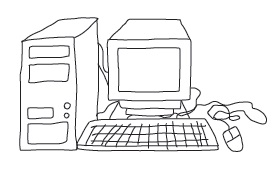
For added scientific value (and, hopefully, added marks), I will use graphs, tables and charts wherever I can to illustrate my
data
(things I learned from my experiments) once I figure out how to format them on our family's ancient, lame computer. These illustrations will appear only in black and white because, even in the interests of groundbreaking scientific research, my dad won't spend the extra money on a color cartridge for the printer. (Apparently, black and white was good enough for him when he went to school in the 1980s and had a computer the size of a dishwasher.)
Depending on the topic, some illustrations may even have to be hand-drawn, but they will still be highly scientific. Many, many scientists from the past had no computer and scribbled out their stuff by hand, and I'm very sure their teachers never lowered their grades because of it.
But what, you may ask,
is
a jerk? What is an idiot?
What do we mean by these words? Jerks and idiots don't
look
any different from normal people, so it can be tricky. Well, let's head to the experts. The
Oxford
Dictionary of English
, a very big, very heavy book, defines both words:
â
jerk
noun, informal: a contemptibly foolish person
(you have to get past the “sudden movement” and the “raising of a barbell above the head” definitions to get to the one we want)
â
idiot
noun
,
informal
:
a stupid person
(it also gets into the old definitions about people of low intelligence, which is just plain hurtful and is not the way
anybody
uses the word these days)
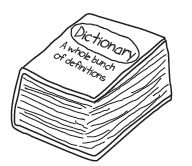
Now, I'm sure some very smart people wrote those definitions. You pretty much have to be smart to write dictionaries. You also have to factor in that those dictionary writers had to write a whole bunch of definitions as well, because the book is about nine thousand pages long and
heavy
.
But really? How lame can those definitions be? Even if we assume that they have to keep them short and snappy, a jerk as a “contemptibly foolish person”? An idiot as merely “a stupid person”? I think we can do better.
Recognizing jerks and idiots is instinctive. It's all about the way people act. When we say somebody is an idiot, we don't really mean they aren't intelligent. Many of the total idiots I know do very well in school.
But they also do stupid and annoying things. Like, for example, the kid that repeats everything you say (he repeats everything you say!), so you tell him to shut up (
Shut up!
he mimics), so you say “Okay, now just stop it!” (
Okay, now just stop it!
). And it goes on and on until you're running away and he's running after you until you find a door between you and him that you can slam and lock.
But interestingly, while idiotic behavior can be, and usually is, highly annoying, it is rarely deliberately mean. That's jerk territory. So when we mutter “jerk” under our breath, we generally aren't thinking “You are a foolish person; therefore, I have contempt for you,” like the dictionary thinks we are. What we mean when we think somebody is a jerk is that the person is
doing
something stupid or really annoying
in a
deliberately stupid, annoying and mean way
. Jerks
act
like jerks. It may have started as an idiotic or jerkish idea in their brains, but it's when they start
doing
something jerkish that most of us notice.
The following diagram illustrates how this works.
Scientific Illustration #1:
The Phases of a Jerk's Behavior
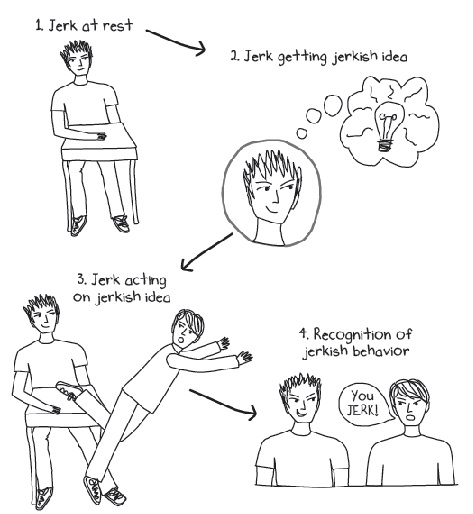
A lot of the time, we don't really study jerkish behaviorâwe just recognize it at a gut level, then ignore, avoid or challenge it. So, here's an example. A few days ago, I answered a question in class and sort of stumbled over the answer. It was just a little thing. Instead of saying “double-you” for the letter
W
, I said “d
w
ubble-you.” It was just a slip. Too early in the day. Whatever. Now (a) I
knew
I said it wrong (I've actually known how to pronounce that letter since I was about three years old), and my face went red and hot, and I corrected myself immediately, and (b) everyone else in class knew I said it wrong, and most of them said nothing. Most normal people just sort of think in their heads, “Oops, slipped up there.” And then they let it go, because it's embarrassing, but everyone makes mistakes. That's what most normal people would do. Now, a jerk would make a huge big deal about it.
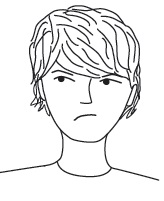
“Dwubbleyou?? DWUBBLEYOU?? You said DWUBBLEYOU!!! Ha, ha⦔
This is an actual quote by a certain known jerk in my class. She could not let it go and even brought it up again at lunch. I ignored her. It was the dignified option. What can you even do about a jerk like that?
D) A Jerk by Any Other Name: A Note on Language
Often when people describe jerks, they don't say what they really mean. They use euphemisms, which are nicer, kinder words that sound better but essentially mean the same as
jerk
. Adults often do this; kids, not so much. Why this hesitation in calling a jerk a jerk? There appear to be four main reasons: being polite, being kind, being professional and being clueless.
1) Being polite
Lots of non-jerks do not publicly use the word “jerk
”
to describe other people. It seems impolite and somehow even illiterate, as though you couldn't think of a better word and just settled on darkly muttering, “What a jerk!” But if an adult describes someone as “a real character,” “hypercompetitive,” “high-maintenance,” “an overachiever,” “not pulling their punches,” “very intense,” “inflexible,” “blunt” or “stressed out,” they just might be delicately dancing around the word “jerk.”
2) Being kind
Kind people often shy away from name-calling. That reluctance to hurt another person's feelings is part of the reason they aren't jerks themselves. I would argue that calling a jerk a jerk is more a matter of classification, but that may just be my inner scientist talking. My mom is a frustratingly kind person. Example: A new kid in my class behaves like a jerk. She's rude and disruptive and just kind of mean. But when I tell my mom, she says things like “It's hard to be the new kid,” “It's early days,” “It's a period of adjustment” and “Give her time.” And that all might be true. But the kid might still be a jerk.
3) Being professional
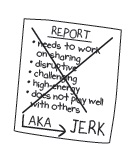
Rarely, if ever, will a teacher write “This kid is a complete jerk” on a report card. Correct me if I'm wrong, but I doubt it's ever been done, even when the teacher was very, very tempted. First, it wouldn't be terribly professional. Second, report cards are read by parents, who might be kind of touchy about their child being called names by their teacher. So teachers hide behind more official-sounding teacher words when they write report cards, saying the child “does not play well with others,” “is consistently disruptive in class,” “makes poor choices” or “needs to work on sharing.” Teachers may, when talking to parents, use words like “high-energy,” “challenging,” “difficult,” “demanding” and “uncooperative,” or even go so far as to say the child is “a real handful” (you have to imagine the small, weary smile and the shake of the head. And the nodding of the parents). Anyway, all of these are obviously possible code words for “jerk.”
4) Being clueless
Some parents must secretly know that their kids are jerks. This must be hard, because jerks are generally disliked. People pretty much want to get away from jerks. But when you've given birth to a jerk, you're stuck with them. This difficult situation explains why some parents tend to look around for reasons (however ridiculous or inapplicable) to explain away the jerkish behavior of their children. Some kids do have real medical or psychological problems and issues, obviously. But some don't.
They're just jerks.
And some parents just can't accept that their kid is a jerk. But when parents start saying that “people just don't understand” their kid, that he “needs a more supportive environment,” has “got in with a bad crowd,” is “going through a phase,” is “deep, deep down a good person” or that he's “having some issues,” they may just be looking for happier words than “jerk.” And can you really blame them? They have to live with the jerk.
